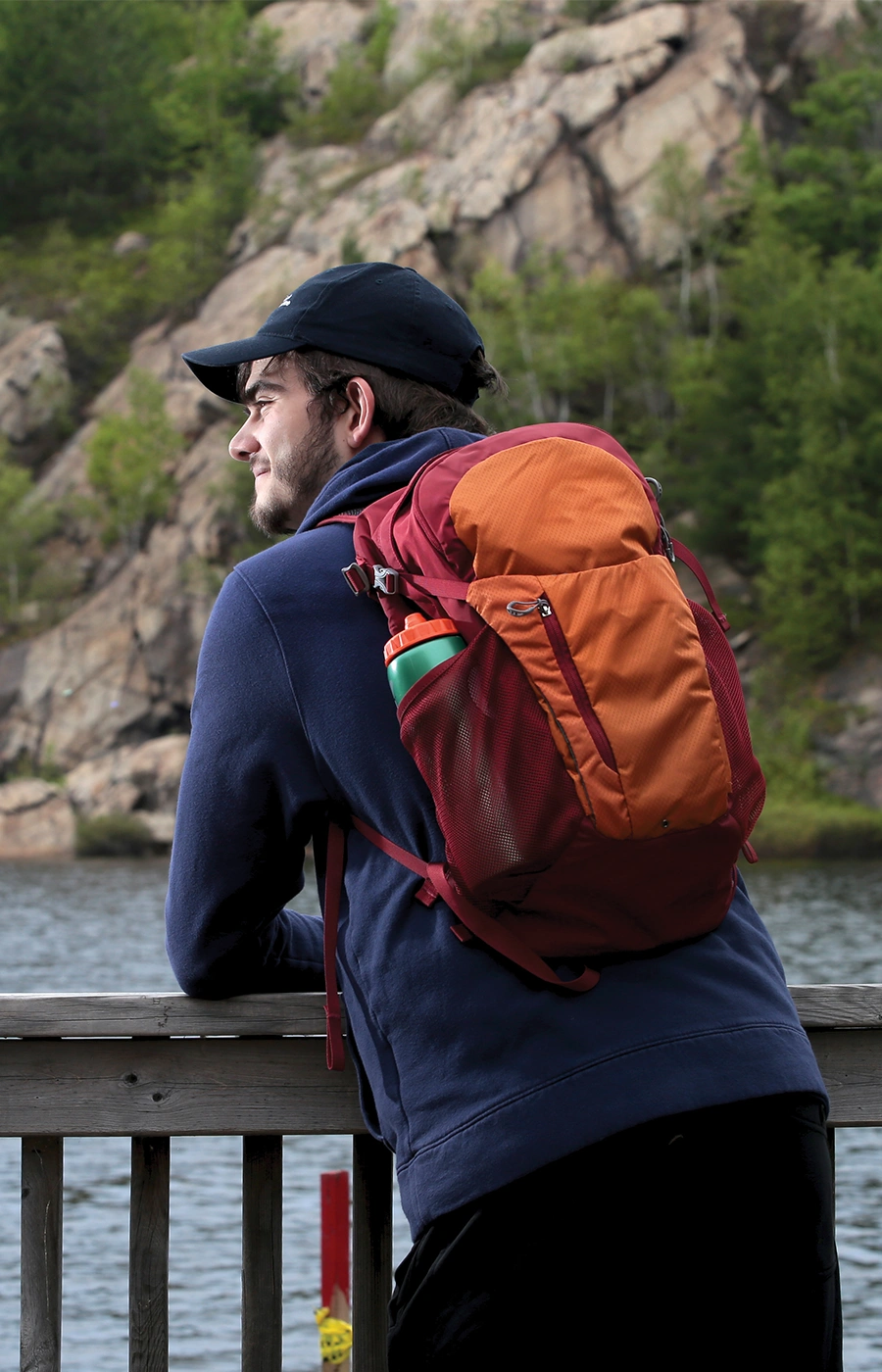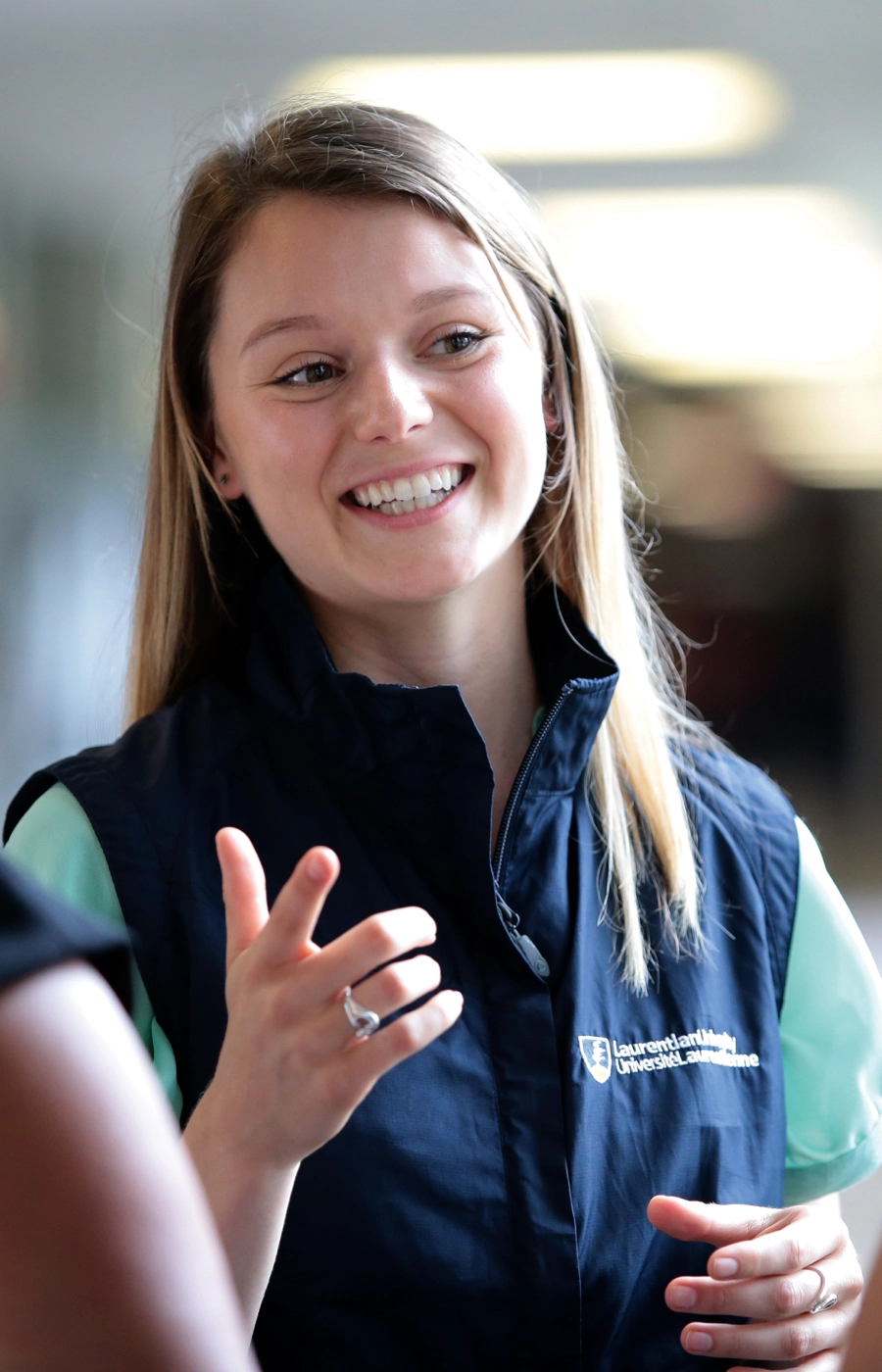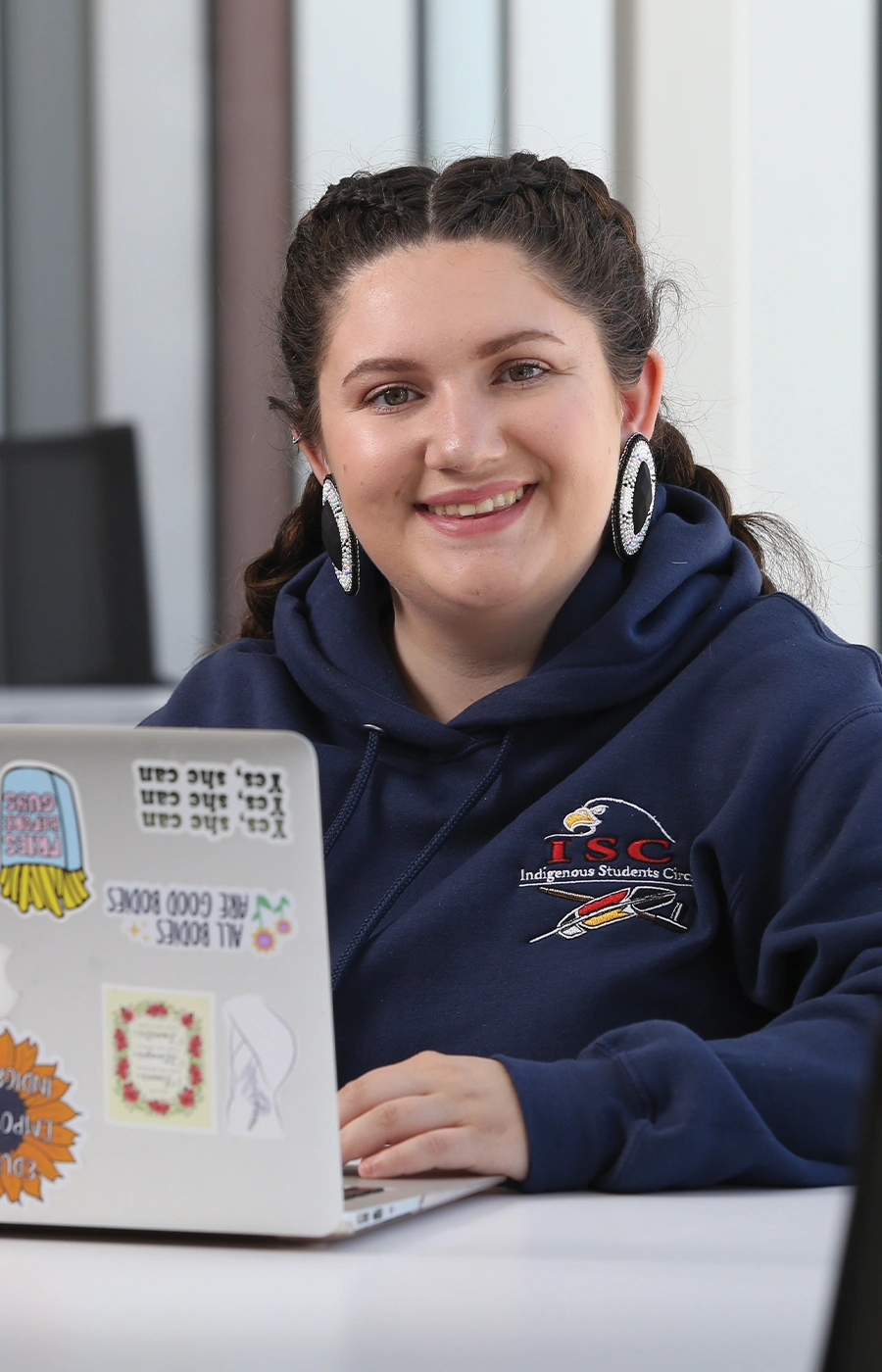
Mineral Deposits and Precambrian Geology (PhD)
Faculté des sciences, de génie et d’architecture
Push the boundaries of geoscience

Survol du programme
Position yourself for employment success at the world-class Harquail School of Earth Sciences and its Mineral Exploration Research Centre; in Sudbury, the world’s largest mineral exploration and mining-service cluster.
Access one of the largest Earth science resource centres in North America that provides ample opportunities to find employment within your field while studying at Laurentian University. Expand your knowledge as a professional in a field full of research and networking opportunities. Located in the same building, the Willet Green Miller Centre, are several mining-related organizations such as the Goodman School of Mines, MIRARCO Mining Innovation, the Ontario Ministry of Northern Development and Mines, and the Ontario Geological Survey.
Prepare for a career of pushing the boundaries of geoscience research and innovation in today's mineral exploration industry, government and consulting agencies. The Harquail School contains a wide array of analytical instrumentation to support both the research and educational needs, and benefits from sharing laboratory facilities with the Geo Labs, one of the largest and most advanced geoscience analytical facilities in North America. Get a virtual tour of the instrumentation and Laurentian University campus via our ArcGIS StoryMap!
Choose a research project based on your geoscience interest. Our faculty is recognized internationally, have won reputable awards and are leaders in their respective sub-disciplines. Research areas range widely from ore deposit geology, volcanology, structural geology, sedimentology, paleontology, mineralogy, igneous petrology, metamorphic petrology, to geophysics, environmental geosciences, and bioremediation.
PhD program applicants are encouraged to choose their own specialization, or consider pursuing a funded research project. View a list of available funded projects on the Harquail School of Earth Sciences Careers page.
Take advantage of an impressive array of analytical instruments and technology, allowing you to conduct cutting-edge research that aligns with industry standards.
The Harquail School of Earth Sciences is ranked #1 in Canada in National Sciences and Engineering Research Council (NSERC) funding in economic geology and in applied geophysics. Laurentian University is #1 in Ontario in mining and mineral processing research.
Travel nationally and internationally - into the field and to geology & mining conventions - while being based in a world-renowned mining and innovation hub, filled with networking opportunities.
Perspectives de carrière
PhD graduates of the Mineral Deposits and Precambrian Geology program have extensive geoscience knowledge and skills. They are prepared for a career of pushing boundaries of research and innovation within their personal geoscience fields or professional networks such as
- ore deposit geology
- geophysics
- 3D computer modeling and geostatistics
- planetary science
- governmental consulting
- academia
- science communication
- analytical laboratory technologist
- financial analysis
Détails du programme
Langue du programme:
Anglais
Mode de présentation:
Sur campus
Coordonnées
Dr. Stefanie Brueckner(705) 675-1151 ext. 5150
B8035, Willet Green Miller Centre
sbrueckner@laurentian.ca
Veuillez écrire à l’adresse courriel ci-dessus et notre équipe de recrutement vous répondra!
En savoir plus sur le programme
Positioning students for employment and success
The Harquail School of Earth Sciences and its Mineral Exploration Research Centre (MERC) are housed in the Willet Green Miller Centre in Sudbury, the world’s largest mineral exploration and mining-service cluster. The building houses several mining-related research centres such as the Ontario Ministry of Northern Development and Mines, the Ontario Geological Survey, the Ontario Geoscience Laboratories (Geo Labs), making it one of the largest earth science resource centres in North America and a great resource for students to find employment within their field while at Laurentian University. The Harquail School contains a wide array of analytical instrumentation to support both the research and educational needs, and benefits from sharing laboratory facilities with the Geo Labs, one of the largest and most advanced geoscience analytical facilities in North America.
Visit the Harquail School of Earth Sciences website to learn more about the faculty, current projects, research areas, student and alumni experiences and events!
Professional Accreditation
The four-year B.Sc. in Earth Sciences is designed to meet the minimum knowledge (academic) requirements for registration as a professional geoscientist (P.Geo.) with the Association of Professional Geoscientists of Ontario (APGO). Registration with the APGO will significantly enhance career prospects of Earth Sciences students.
Laurentian is the leading Canadian university in Economic Geology research funding.
The Mineral Exploration Research Centre (MERC) is a collaborative research centre at Laurentian University affiliated with the Harquail School of Earth Sciences. The Harquail School of Earth Sciences has by far the highest level of Natural Sciences and Engineering Research Council (NSERC) and Targeted Geoscience Initiative (TGI) funding in economic geology in Canada.
Metal Earth, Canadian $104 million applied research and development program
The most recently funded project called Metal Earth, is a 7 year, $104 Million collaborative research and development project initiated in 2016 and led by MERC. This initiative received a boost of $49,269,000 over seven years from the Canada First Research Excellence Fund (CFREF). This is the largest funding announcement in Laurentian’s 56-year history and the largest exploration research program ever undertaken in Canada, providing undergraduate students with the possibility of obtaining valuable hands-on summer work experience by conducting research in the field as part of this initiative. Findings from Metal Earth will be transferable around the world and position Canada as an authoritative leader in the global quest for metals.
Exigences d’admission
Students entering the program must have a M.Sc. degree in Geology or an Earth Science related field, with a grade in excess of 75%. Students may also transfer from the M.Sc. program after one year, if approved by their Supervisory Committee.
Application Process
Step 1. Students are encouraged to consult the faculty list on the Faculty Members to identify a potential supervisor (i.e. a faculty member they would like to work with). Applicants should contact potential supervisors and inquire about the possibility of becoming a student. The application process requires a formal commitment from a faculty member to serve as the main supervisor (Thesis Supervisor Agreement Form).
Step 2. Click here to submit the online application. Once students have applied, they will receive instructions (typically within 48 hours) from the Office of Admissions leading them to the MyLaurentian portal. Students can access the portal at my.laurentian.ca; sign in credentials will be provided in the correspondence received from the Office of Admissions upon successful completion of an application. The following documents will be required in order to complete an application.
Documents:
- Three Reference Forms (to begin the process at my.laurentian.ca click on "Reference Submission" on the left-hand navigation menu)
- Statement of Interest (to be uploaded via MyLaurentian)
- Thesis Supervisor Agreement Form (found and uploaded via MyLaurentian)
- Curriculum Vitae/Resume (to be uploaded via MyLaurentian)
- Official Academic Transcript(s) from all post secondary studies* (Please note that current or prior Laurentian University students do not need to request transcripts)
*Please note that official transcripts or WES course-by-course (for institutions attended outside of North America) must come directly to the Office of Admissions from the previous post secondary institution by requesting at the time of your application or by contacting the institution's Registrar's Office.
Step 3. Once the Admissions Office receives all information and the application is deemed complete, the application will be forwarded to the department. An Admissions Committee meets to review the applications.
Step 4. The Admissions Committee will review all applications on file and make a decision regarding the suitability of each applicant. The Admissions Committee will then make a recommendation to the Dean of the School of Graduate Studies at Laurentian University. The Graduate Studies office will verify the dossier and if satisfactory, the Dean of Graduate Studies will forward the recommendation to the Office of Admissions at Laurentian University for admission.
Step 5: If approved for admission, the Office of Admissions will send the student an Offer of Admission via MyLaurentian. Applicants wishing to accept the offer of admission must indicate their response on MyLaurentian within 3 weeks of receiving the offer. Once the student has accepted the offer, a transition to the registration process occurs.
Comment déposer une demande
Pour faire une demande aux études supérieures, vous devez déposer votre demande d’admission auprès du Centre de demande d'admission aux universités de l'Ontario (CDAUO).
Pour obtenir des instructions détaillées sur le processus de demande d'admission, veuillez consulter les pages suivantes :
- Comment déposer une demande : Candidats canadiens aux cycles supérieurs
- Comment déposer une demande : Candidats internationaux aux cycles supérieurs
Déposer une demande en tant que candidat aux cycles supérieurs
Options de diplôme
Students must follow these regulations while in the Faculty of Graduate Studies.
Approved Fields of Study
- Mineral Deposits and Precambrian Geology
Program Requirements
Mandatory courses:
GEOL 6000E Thesis
GEOL 6007E Research Seminar in Geologyy (Under exceptional circumstances this course may be replaced by another graduate course in Geology)
9 credits GEOL 5000 or 6000 level
Candidate(s) must submit a PhD research proposal and pass an oral PhD Qualifying Examination within 18 months of registration. To complete the Thesis requirement (GEOL-6000) candidates must successfully defend a PhD Thesis and submit a corrected version post-defence.
In addition to the requirements listed above, candidates who are transferred from the MSc degree to the Ph.D. program will require an extra 6 credits of GEOL courses at the 5000 or 6000 level.
Residency Requirements
A minimum of two full academic terms of full-time residence is required for all Ph.D. students within their first two years of study. The minimum period of study is two years (full-time) for candidates holding a M.Sc. degree, or three years (full-time) for candidates entering the program with a B.Sc. Honours degree
Exemples de cours
This course is designed to train students at the graduate level in a wide variety of techniques commonly used to collect standard types of data used in geological research. These techniques include x-ray diffraction; X-ray fluorescence; wet chemical techniques for dissolving silicate rock materials; atomic absorption spectrophotometry; H2O and CO2 analysis; U-stage optical techniques; and methods of storing, retrieving and analyzing data using the department's interactive computer terminal. Other techniques to be added as they become available. In the lecture portion of this course, the theoretical basis for each technique will be discussed. Practical applications of each technique to geological problems will be strongly emphasized. Students will be required to show competence in each of the techniques to successfully complete the course. cr 3
The goal of the course is for students to develop and improve their communication skills. The focus of the course is on conference-style oral presentations, how to write effective abstracts, and how to deliver high-quality, engaging, and effective presentations. Instruction is based on lectures, complemented by group activities and peer feedback. Students are expected to present two seminars (one per year) on relevant topics, selected in consultation with their supervisors. At least one seminar shall be based on the student's research. Students are expected to attend all research seminars. (lec 1, sem 1) cr 3
This course is required for and limited to students enrolled in the coursework master's option in Geology. Students will register for the course each semester that they are enrolled in the program. They will select a research topic in consultation with a faculty advisor during the first course module, prepare a research proposal for evaluation at the second course module, present short seminars during successive course modules, and submit the results of their research in a written format. It is expected that full-time students will complete the research project course within two and one-half years after the date of initial enrolment. cr 6
A lecture-seminar course on the structure, crystal chemistry, phase equilibria, and natural occurrences of the more common rock-forming minerals. Prerequisite to the course is an adequate undergraduate background in mineralogy, igneous and metamorphic petrology, and economic geology. cr 3
This is a lecture-seminar course covering selected topics in igneous petrogenesis. Students will also undertake a major term project selected in consultation with the professor. cr 3
This course covers selected topics in metamorphic petrology and geochemistry. Current periodical literature will normally form the basis of discussion topics. Lectures, student seminars and field excursions are included. cr 3
This course covers, first and foremost, the coupling of surface and crustal processes on Earth. More specifically, the course examines: (i) the genetic classification of ancient and modern sedimentary basins; (ii) the relationships between supercontinent cycles and mechanisms of basin generation and destruction; and (iii) the secular evolution of sedimentary basins through geological time. Current topics may also be considered. PREREQ: GEOL 3217EL or equivalent from other universities. (lec/sem/cst 3) cr 3.
Use of facies models in the interpretation of the structural, stratigraphic and sedimentary framework of depositional basins. Application of sedimentary facies models to hydrocarbon exploration and exploitation. cr 3
This lecture-seminar course addresses the diversity of carbonate lithofacies and their spatial and temporal distribution. Topics span the full geographic range of carbonate depositional environments, including peritidal, shallow-marine, reefal, slope, pelagic and terrestrial (lacustrine, tufa, travertine, speleothemic carbonates) settings, and associated evaporitic lithofacies. The evolution of carbonate depositional systems is traced through time, following the geochemical evolution of the atmosphere/hydrosphere and the evolutionary addition of new biological groups to the carbonate-sediment-generating system. (lec 3, sem 3) cr 3.
A lecture-seminar course on strain and kinematics of shear zones and transpression zones, the development of vein-fracture systems, stress and fluid pressure cycling during ore genesis, and deformation and recrystallization processes in sulphide minerals. Structural controls on the development of mineral deposits will be emphasized. Other topics tailored to individual student146s research needs will be considered. cr 3
This course will address the tectonic and structural controls on the localization and genesis of mineral deposits. It will examine regional tectonic settings, regional structural controls, and local structural controls, using the lode Au deposits in Northern Ontario as a case study. The course is normally given in a field trip mode and will include evening lectures and field/underground mapping exercises. All field costs will be borne by the student. NOTE: The course is typically held during the last week of August and first week of September cr 3
Topics covered in this course will be selected from applications of remote sensing to geological, land cover and water quality mapping. cr 3
This course will focus on: a) the products and deposits formed by volcanic eruptions; b) eruptive processes and styles; c) mechanisms of emplacement, and d) landforms produced. Special emphasis will be placed on mineralisation and alteration processes associated with hydrothermal systems in both submarine and subaerial environments and the application of information gained from these systems to exploration. The course is normally given during a 10-12 day field trip. All field costs to be borne by the student. cr 3
The application of paleoecological principles and theory to the analysis of ancient environments. The distribution of major ecosystems in time and space: paleobiogeography of the Phanerozoic. Terrestrial paleoecosystems: fossil faunas and floras of upland to lowland environments, equatorial and polar latitudes; lacustrine and fluvial settings. Coastal paleoenvironments: estuaries, deltas, supratidal and intratidal settings. Marine paleoenvironments: shelf settings, siliciclastic and carbonate, the slope, reefs. The deep sea and its fossil record: refugia during mass extinctions. cr 3
This lecture-seminar course covers selected topics in the early evolution of life. Special emphasis is placed on the appearance, taphonomy, evolution and utility of prokaryotic organisms as recorded in Precambrian and Phanerozoic microbialites and organic-walled microfossils, the early fossil record of protists and algae, fossil evidence of the Precambrian-Phanerozoic transition, and selected aspects of Paleozoic marine invertebrate paleontology. (lec 3, sem/lab 3) cr 3.
This course will examine the long-term record of global change as reflected in sedimentary rocks, fossil faunas and floras and low-temperature isotope geochemistry. Topics to be considered will include: major changes in biogeochemical cycling processes of carbon, phosphorus, nitrogen, and sulphur through geologic time; lithosphere-ocean-atmosphere interactions; sedimentary suites as paleoclimatic keys; siliciclastics, tillites, paleosols, carbonates, evaporites, laterites, phosphorites, coals; sedimentary processes related to global change: e.g. sea level changes, storm events, climate cycles; fossils as paleoclimatic keys: reefs and reef organisms, stromatolites, coralline fossils, shelly fossils, paleobotany and palynology; plate tectonic models and mountain-building as forcing mechanisms for climatic change, extraterrestrial forcing (e.g. Milankovic cycles, impacts, etc.). cr 3
This course will focus on the geology and petrogenesis of magmatic ore deposits. Deposit types will include Ni-Cu-PGE sulphide, chromite, magnetite and ilmenite deposits. Emphasis will be placed on the processes responsible for their formation and the features pertinent to exploration. cr 3
This course will focus on the geology, alteration and origin of hydrothermal ore deposits. Deposit types will include epithermal and mesothermal precious metal, porphyry Cu and Cu-Au, and VMS deposits. Emphasis will be placed on the processes responsible for their formation, the recognition of alteration halos, and the features pertinent to exploration. cr 3
This course will address the principles and methods of geochemical exploration, including planning, sampling, geochemical analysis, data handling and interpretation. It will include case histories of stratiform PGE deposits in layered intrusions, magmatic Fe-Ni-Cu-(PGE) sulphide deposits in ultramafic lavas, porphyry Cu deposits, volcanic-associated Cu-Zn-(Pb) deposits, Archean lode gold deposits, sedimentary-exhalative Pb-Zn-Cu deposits, and diamond exploration. cr 3
The scope of this course includes concepts of Precambrian crustal evolution; the synthesis of wide-ranging geological data in modeling the evolution of Precambrian cratons, as well as discussion of the most recent field work in the Canadian Shield, especially in Ontario. cr 3
This course will focus on the application of magnetic, gravity and electrical techniques in mineral exploration, including remote sensing, image processing and geographic information system (GIS) management. cr 3
This course covers the fundamentals of geophysical methods including the theoretical background, modelling techniques, hardware, data acquisition, processing methods, and geophysical interpretation techniques. PREREQ: an undergraduate course in geophysics and in mathematics, preferably applied mathematics. (lec 3, sem 3) cr 3.
The goal of the course is for students to develop and improve their communication skills. This includes how to write effective abstracts and deliver high-quality oral presentation, but also how to structure, write, and edit other technical and scientific documents. Instruction is based on lectures, complemented by group activities and peer feedback. Students are expected to present two seminars (one per year) on relevant topics selected in consultation with their supervisors. At least one seminar shall be based on the student's research. Students in residence are expected to take the course during the first two years of study and to attend all research seminars. (lec 1, sem 1) cr 3
This is an independent study course on a topic in geology that is not covered in another graduate course in the Department. Written description of the project must be submitted to the Thesis Advisory Committee and the Department for approval prior to registration. This course is only available to PhD students and can only be taken once for credit. 3 cr.
Membres du corps professoral
Prêt(e) à passer à la prochaine étape?
Nous sommes là pour vous aider à commencer votre parcours à Laurentienne.



